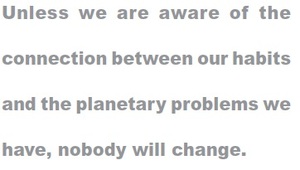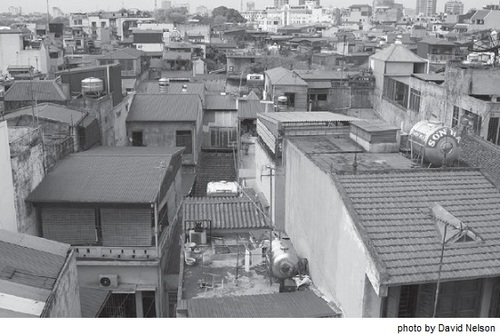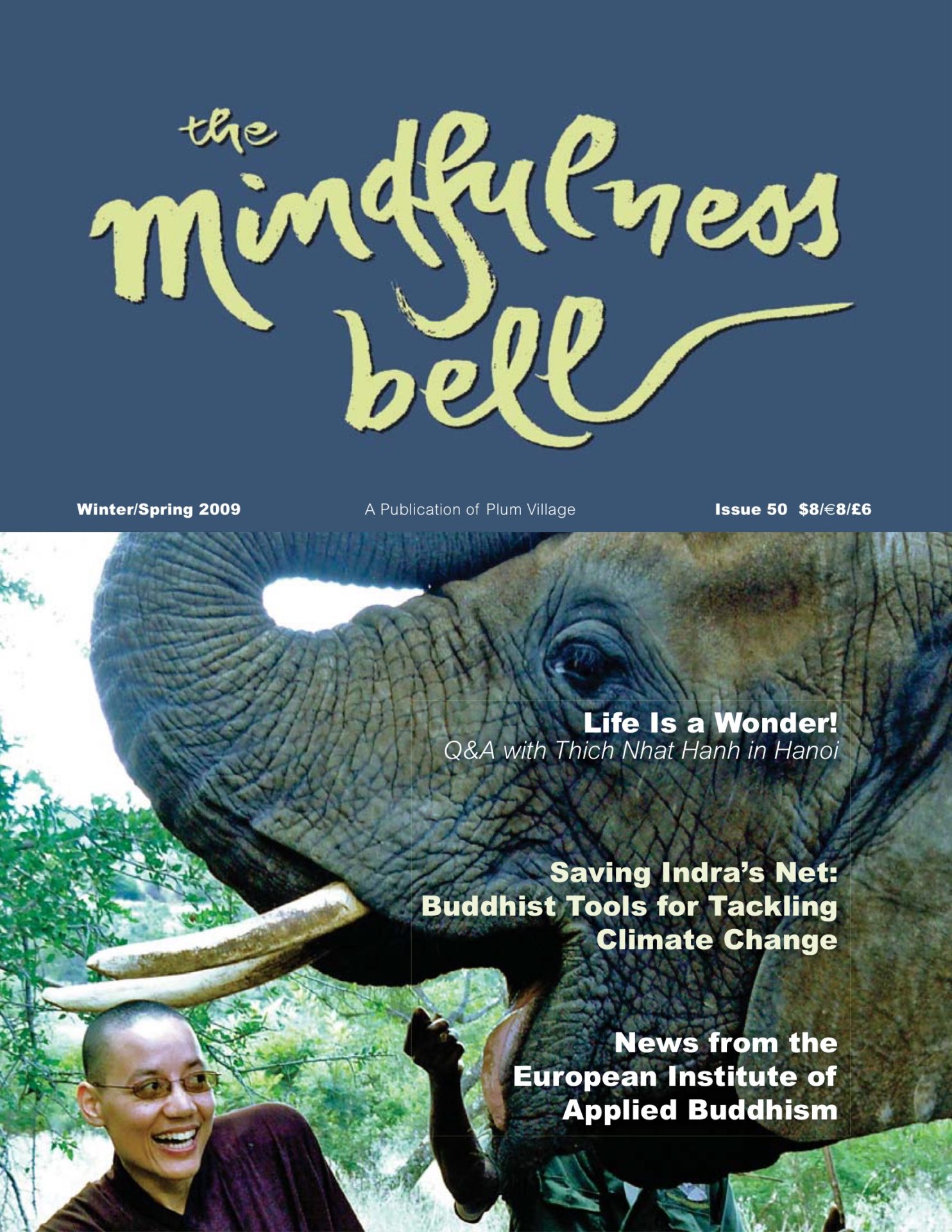Buddhist Tools for Tackling Climate Change and Social Inequity
By Angela Tam
We had some sort of good news last December, when government leaders met at the Bali Summit on Climate Change. They agreed to make “deep cuts” to carbon emissions, albeit without specifying how deep. They also agreed to transfer clean technologies to developing countries and reward those countries for protecting their forests.

It looks like governments have responded to the UN’s call and mustered the political will to take action.
Buddhist Tools for Tackling Climate Change and Social Inequity
By Angela Tam
We had some sort of good news last December, when government leaders met at the Bali Summit on Climate Change. They agreed to make “deep cuts” to carbon emissions, albeit without specifying how deep. They also agreed to transfer clean technologies to developing countries and reward those countries for protecting their forests.

It looks like governments have responded to the UN’s call and mustered the political will to take action. What’s more, even businesses appear to have come round to the need to protect the environment: they are recycling paper, planting trees, participating in carbon trading. And citizens and NGOs, of course, have been at the forefront of the call for action.
But let’s put all this in perspective.
The issue of climate change has been around for some time: if we go back about half a century, we would find the New York Times editorial entitled “How industry may change climate,” dated 24 May 1953, that environmental scientist David Keith of the University of Calgary has referred to in a talk.(1)
Earth Day has been around since 1970, but if we think back to Henry David Thoreau and the Transcendentalists, then the environmental movement has been around for even longer. Unfortunately, despite the long-standing awareness of the threat and the persistent call for action, nothing much has been done, and the Intergovernmental Panel on Climate Change had to issue a dire warning (2), telling us that, effectively, we now have just seven years (eight when the report came out in 2007) to sort it all out before it’s too late.
So now the world’s suddenly woken up to carbon trading, hybrid vehicles and technological solutions that include sending some kind of sun-shading device into space to cool the planet.
Is It Enough?
Here’s some food for thought:
- Suppose everyone switches to energy-saving lamps, but also buys new, big plasma TVs along with various electronic Would the outcome be an increase or decrease in energy use?
- Suppose car manufacturers all start making electric hybrids to Euro V standard, but millions more take to the Would the outcome be an increase or decrease in oil consumption?
- Suppose we switch to biofuels, would we have the land and water resources to produce enough for both our cars and us?
The World Wildlife Fund (WWF) Hong Kong commissioned a survey on climate change (3) and the results are set out below:
- 92% of the people interviewed state that they are “very” or “somewhat” concerned about climate change
- 87% agreed that individuals share a great responsibility to act and over 90% said they would buy energy efficient lamps (94%), turn off standby appliances (91%) or adjust the temperature of air-conditioning (91%); but
- 69% didn't agree that utility tariffs should be raised to discourage wastage
You see, the way the world economy works is predicated on an externalization of costs that makes it possible for goods and services to be sold at remarkably low prices. And unfortunately, those of us in the developed countries have become so accustomed to this that, as much as we want to do our bit for the environment, we don’t want the effort to cramp our style. We don’t want, for instance, to lose the convenience of using disposable cups, chopsticks, and take-out lunch boxes, even though they create waste and pollution everywhere, not to mention the energy and resources required to make them, to be used just once before being thrown into a landfill.
The market is very smart; it knows that if it can come up with disposable alternatives that are “green,” we wouldn’t think about changing our habit at all. I was at an eco-expo recently where someone was selling disposable lunch boxes and mugs made from corn. He was very happy about the high oil prices, because they made his products more attractive to potential buyers, but I couldn’t help thinking about all the water and land that are used to make disposable lunch boxes rather than grow crops to feed people. So do we want food for everyone, or do we want disposable lunch boxes?
The Root Cause of Climate Change: Craving
Efforts to protect the environment have failed in the past and will continue to fail for as long as we are blind to the interrelated nature of all the issues and remain ignorant of our interdependence— that we are all in this Indra’s Net together. Living in cities where we function only as consumers, with little knowledge of the impact of the processes that bring food to the table, clothes on our backs, and PlayStations in our children’s bedrooms, it’s hard to see how our whole way of life is hurting the planet and ourselves. Green NGOs take people to visit landfills because the experience allows them to finally put two and two together and the effect can be quite dramatic: they see for themselves how all the waste stacks up and they swiftly stop using plastic bags, for example.
Unless we are aware of the connection between our habits and the planetary problems we have, nobody will change. Unfortunately, even landfills show very little of the impact our consumerist lifestyle imposes on both people and the environment. Let’s try to picture this: somewhere in an Asian village a piece of farmland is cleared to make way for factories where migrant workers are paid a small wage to churn out the shoes, toys, and gadgets wanted by consumers around the world. Crops are lost to the factories, and suddenly the villagers are sick and the remaining farmland poisoned by the polluted rivers.

In the meantime, consumers in the developed world who have lost their stable jobs in manufacturing are getting by on part-time or poorly paid contract work while relying on credit to pay for the cheap imports — which won’t be cheap for much longer because the prices of raw materials and transportation have gone up due to climate change. Many countries make-believe that they have attracted foreign investment, but other than the meager wage paid to the migrant workers, what else have the host countries of these factories gained other than pollution, loss of cropland and depletion of natural resources that, once lost, will never be available again? A few attain material affluence, and certainly the top managers in the companies selling these goods — and their financial backers— make lots of money out of this, but for the majority, do their wages and long working hours compensate for the loss of contentment and the sense of community that grounds them? Is this really how we want to see the world come full circle?
All this has been happening for a while, but we have not been aware of the bind we’re creating for ourselves because we are too busy wanting this, buying that. Buddhism, however, gets right into the heart of the matter because it tells us that, actually, no, the real cause of climate change is not high levels of greenhouse gas emissions, but our craving. It is because we crave all these goods and services that so much energy and resources are devoted to their production, which, in turn, lead to the release of so much greenhouse gas as well as a widening wealth gap.
And Buddhism doesn't just tell us what's wrong; it gives us the tools for tackling the problem as well, in the form of the precepts and the Noble Eightfold Path. Thay’s elaboration of the five precepts is particularly useful because they are made relevant for the modern world. The Fifth Mindfulness Training is particularly relevant for the modern consumer because it reminds us to be mindful of not only what we traditionally regard as “intoxicants,” but also of what we see on TV, read in magazines, and so on. After all, advertising, whether subtle or not so subtle, is responsible to a great extent for the craving that’s causing so much difficulty for us.
The environmental movement has been slow to make headway because, most of the time it is, as the saying goes, “preaching to the converted” or up against stiff resistance. It owes its success of recent years to the fact that different elements of the movement have been co-opted by consumerists; look no further than the craze over the “I’m not a plastic bag” campaign.
Skillful Buddhist Means
Buddhism, on the other hand, stands a better chance of reaching people of different persuasions because, whether we know it at this moment in time or not, we all want to be happy and find meaning in life. Three Buddhist concepts are of vital importance:
- Dependent origination
- Mindfulness
- Sangha
We need people to understand what the concept of dependent origination means for them, in a language that everyone can understand. When I talk to architects and surveyors about sustainable building, I like to use a technical term they can relate to — ‘life cycle cost’. But really the idea is no different from that of the clouds, the sun, and the soil contributing to the growth of a beautiful flower. Bringing personal experience to bear, like the green NGOs taking people to see landfills, is even better. We need to find ways to make the ancient idea relevant to a modern audience.
Mindfulness, of course, underpins our appreciation of our interdependence. So how about teaching mindfulness meditation in schools? Make it as natural as learning to read and write. There’s a reason why food companies in the U.S. are now forbidden from advertising sugary foods to children under twelve; advertising is so powerful, adults fall for them as well, all the time. By making us aware of the root of the problem, from moment to moment, mindfulness meditation is a powerful antidote against the advertising that we don’t currently realize is responsible for causing so much craving.
In his book One City (4), Ethan Nichtern mentions a fashion magazine designer who, after taking up meditation, became more and more aware of the deeply manipulative nature of her job, and began to wonder whether it was right livelihood. That’s how meditation can help us and the world. Like the designer, some of us may be led to question whether our current work represents Right Livelihood; it is a necessary question and only by having the courage to face it will we stand a chance of coping with climate change and social inequity.
Finally, we need to widen the Sangha, in the sense of a supportive community. Recent research5 demonstrates something very interesting: many people are obese not because they eat the wrong food or do not exercise, but because their social networks consist of people who are heavier than the average. That’s how powerful social networks are. we want to belong; we do what our friends do. If our friends are always shopping for designer clothes and the latest mobile phones, we do too. If our friends recycle and avoid disposable cutlery, we eventually do as well. So if we can cultivate mindfulness Sanghas, we will be able to create social networks that reinforce earth-friendly behaviour.
Upaya, the Buddhist concept of “skillful means,” will need to be applied for the other three to work. Exactly what these skillful means might be is a topic for another day, but I hope we all give them serious thought and set things in motion. We only have seven years.
- Keith, David: “A surprising idea for ‘solving’ climate change”. http://www.ted.com/index.php/talks/view/id/192
- Climate Change 2007: Synthesis Report. 3EE TABLE ON PAGE 67, WHICH indicates carbon emissions must peak by 2015 if average global temperature is not to rise beyond the manageable limit of 4° C.
- WWF Hong Kong: “Air Quality and Climate Change Study”, May 4 Nichtern, Ethan: One City: A Declaration of Interdependence. Wisdom Publications. 2007.
- Aubrey, Allison: “Are Your Friends Making You Fat?”. NPR. http://www.npr.org/templates/story/story.php?storyId=12237644

Angela Tam, Patient Action of the Heart, lives in Hong Kong, where she is active in women’s rights, animal welfare, environmental protection, climate change awareness, sustainable development, and heritage conservation. Author of Sustainable Building in Hong Kong, she also publishes an ezine, Sustainable Living Hong Kong.

